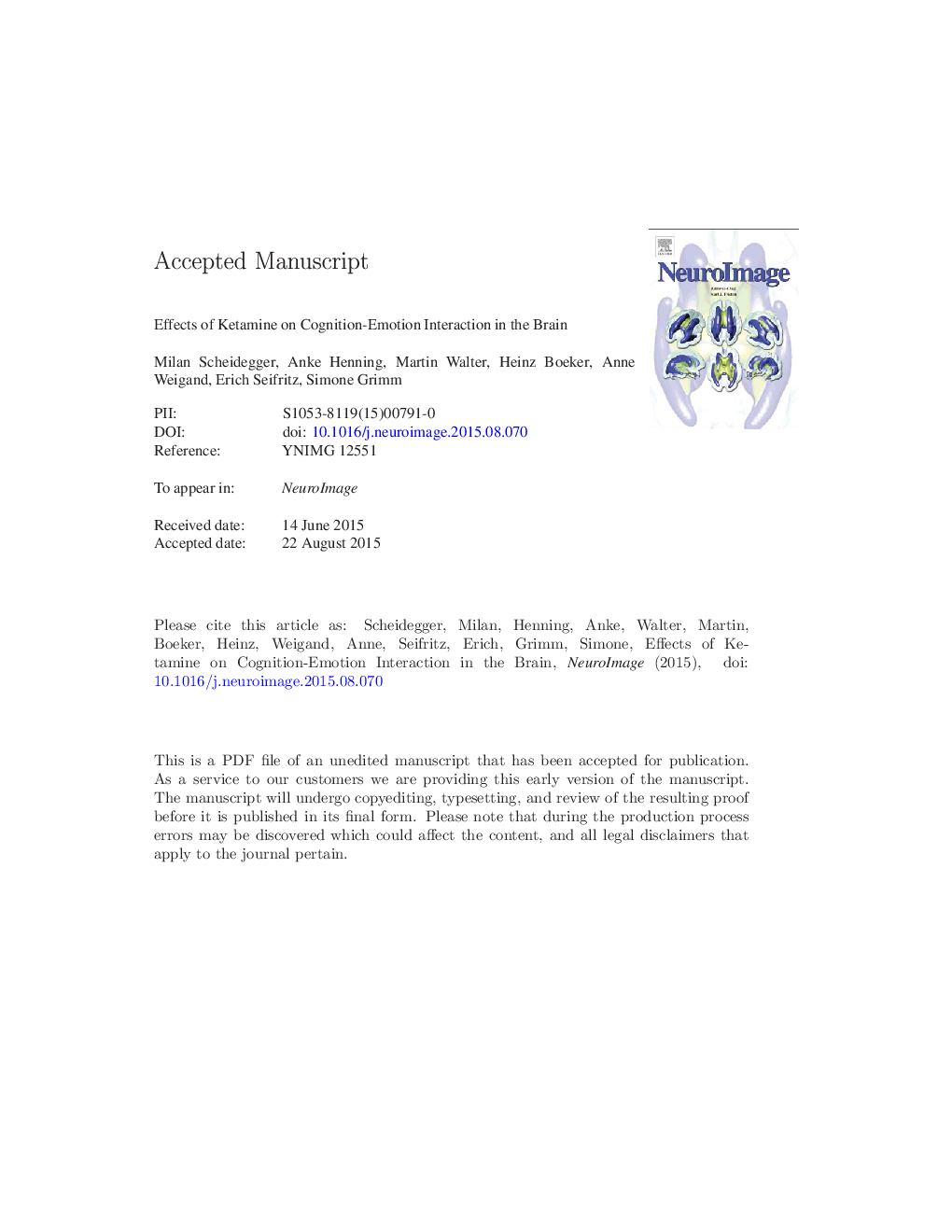| کد مقاله | کد نشریه | سال انتشار | مقاله انگلیسی | نسخه تمام متن |
|---|---|---|---|---|
| 6024239 | 1188658 | 2016 | 25 صفحه PDF | دانلود رایگان |
عنوان انگلیسی مقاله ISI
Effects of ketamine on cognition-emotion interaction in the brain
ترجمه فارسی عنوان
اثرات کتامین در تعاملات شناختی-عاطفی در مغز
دانلود مقاله + سفارش ترجمه
دانلود مقاله ISI انگلیسی
رایگان برای ایرانیان
کلمات کلیدی
کتامین، تعامل احساسات شناختی، حافظه کاری،
موضوعات مرتبط
علوم زیستی و بیوفناوری
علم عصب شناسی
علوم اعصاب شناختی
چکیده انگلیسی
Cognition-emotion interaction in the brain can be investigated by incorporating stimuli with emotional content into cognitive tasks. Emotional stimuli in the context of a working memory (WM) task yield increased activation in WM-related lateral prefrontal regions, whereas cognitive effort enhances deactivation in emotion-related cortical midline regions. N-methyl-d-aspartate glutamate receptors (NMDA-Rs) are critically involved in WM, and NMDA-R antagonists, such as ketamine, accordingly affect WM but also have a profound impact on emotional processing, as underscored by the rapid reduction of depressive symptoms after administration of a single dose of ketamine. The effect of ketamine on both cognitive and emotional processing therefore makes it a useful tool to further explore cognition-emotion interaction in the brain. Twenty-three healthy subjects were administered ketamine to investigate whether its effects on WM performance and brain reactivity depend on emotional content or emotional valence of stimuli. Furthermore, we aimed at investigating how ketamine affects the integration of emotion and WM processes in emotion-related cortical midline regions and WM-related lateral prefrontal regions. Results show that ketamine modulates cognition-emotion interaction in the brain by inducing lateralized and valence-specific effects in emotion-related cortical midline regions, WM-related lateral prefrontal regions and insula. In emotion-related cortical midline regions ketamine abolishes enhancement of deactivation normally observed during cognitive effort, while in the right DLPFC and the left insula the previously described pattern of increased activation due to emotional content is abrogated exclusively for negative stimuli. Our data therefore shows a specific effect of ketamine on cognition-emotion interaction in the brain and indicates that its effect on amelioration of negative biases in MDD patients might be related to less interference of cognitive processing by negative emotional content.
ناشر
Database: Elsevier - ScienceDirect (ساینس دایرکت)
Journal: NeuroImage - Volume 124, Part A, 1 January 2016, Pages 8-15
Journal: NeuroImage - Volume 124, Part A, 1 January 2016, Pages 8-15
نویسندگان
Milan Scheidegger, Anke Henning, Martin Walter, Heinz Boeker, Anne Weigand, Erich Seifritz, Simone Grimm,
